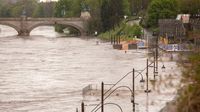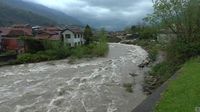Severe storms have struck northern Italy, bringing heavy rain and strong winds that have led to significant flooding and disruptions across the region. On April 17, 2025, numerous rivers, including the Po River—Italy's longest—were reported to be nearing overflow levels, prompting authorities to take immediate action.
In Turin, the capital of the Piedmont region, streets close to the river were closed to traffic as a precaution. The local government declared a red alert in over 100 municipalities, urging residents to remain indoors and avoid unnecessary travel. This extreme weather has not only impacted Piedmont but has also affected neighboring regions including South Tyrol, Lombardy, and Tuscany, all of which are popular destinations for holidaymakers during the Easter season.
According to the Italian news agency Ansa, the storms have caused landslides in Liguria, leading to blocked roads and the evacuation of homes in the Aosta Valley. The forecast indicates that the rain will persist at least until Thursday afternoon, further exacerbating the situation.
Weather warnings have also been issued for the southern Swiss cantons of Wallis and Ticino, where heavy precipitation is expected. Local authorities advised tourists to reconsider travel plans, as conditions could worsen. Experts recommend monitoring the situation closely, as the heavy rains have already led to significant challenges in transportation, including disruptions to train services between Italy and Switzerland.
In the Gulf of Genoa, rainfall has been particularly intense, with reports of over 200 liters per square meter in some areas. The Italian meteorological service has warned that the severe weather will continue into the night, potentially leading to further flooding.
As the storms rage on, many travelers are left wondering about their options. Kay Rodegra, a travel expert, explained that while the German Foreign Office has issued warnings, travelers cannot cancel their trips without incurring costs simply due to the forecast. "The weather is considered part of the general risk of life," Rodegra stated. However, if a hotel or campsite becomes inaccessible due to extreme weather, travelers may have grounds for a free cancellation.
With Easter approaching, the situation is particularly concerning for those planning vacations in the affected areas. Heavy precipitation, thunderstorms, and even snowfall above 1,500 meters are predicted, which could render mountain passes and roads impassable. Regions like South Tyrol, Piedmont, and Lombardy are expected to experience storm gusts, floods, and landslides.
Rodegra emphasized that travelers should check the status of their accommodations before departure. If hotels or campsites are reachable and operational, cancellation fees may apply. "The mere fear of bad weather is not a valid reason for free cancellation," he noted.
In addition to the challenges faced in Italy, the Swiss canton of Wallis is also grappling with the aftermath of the storms. Heavy snow and rainfall have led to landslides, which have closed numerous roads and railways. Schools across the canton were closed as a precaution, and residents were advised to stay at home. The ski resort of Zermatt found itself cut off from the outside world due to the extreme conditions.
In France, similar weather patterns have led to disruptions. The Météo-France weather service issued a second-highest avalanche warning level in the Savoie region due to heavy snowfall. Approximately 4,000 households experienced power outages, and several roads were blocked by fallen trees.
As the storms continue to wreak havoc, meteorologists predict that northern Italy could see up to 700 liters of rain per square meter by the end of the week. This staggering amount is comparable to the annual rainfall in some areas, raising concerns about the potential for widespread flooding and damage.
Travelers hoping to visit northern Italy or the Swiss Alps during this holiday season are urged to stay informed and consider postponing their trips until conditions improve. The impact of these severe weather events is not only felt in terms of travel disruptions but also poses risks to safety and property.
As the situation develops, local authorities continue to monitor the weather closely, providing updates and guidance to residents and travelers alike. Those in affected areas are advised to heed warnings and stay indoors as much as possible until the storms pass.







